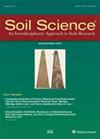Application of the governance disruptions framework to German agricultural soil policy
4区 农林科学
Q2 Agricultural and Biological Sciences
引用次数: 2
Abstract
Abstract. Governance of natural resources is inherently complex and requires navigating trade-offs at multiple dimensions. In this paper, we present and operationalize the “governance disruptions framework” (GDF) as a tool for holistic analysis of natural resource governance systems. For each of the four dimensions of the framework (target adequacy, object adequacy, instrument adequacy, and behavioural adequacy), we formulate guiding questions to be used when applying the framework to particular governance systems. We then demonstrate the use of GDF by applying it to the core of German agricultural soil policy. We show that for each framework dimension, the governance system exhibits deficits, particularly with respect to object adequacy and instrument adequacy. Furthermore, we use the GDF-based analysis to highlight research gaps. We find that stakeholder analyses are a central gap across GDF dimensions.治理破坏框架在德国农业土壤政策中的应用
摘要自然资源的治理本质上是复杂的,需要在多个维度上进行权衡。在本文中,我们提出并实施了“治理中断框架”(GDF),作为对自然资源治理系统进行整体分析的工具。对于框架的四个维度(目标充分性、对象充分性、工具充分性和行为充分性)中的每一个,我们都制定了在将框架应用于特定治理系统时使用的指导性问题。然后,我们通过将其应用于德国农业土壤政策的核心来展示GDF的使用。我们表明,对于每个框架维度,治理系统都表现出缺陷,特别是在对象充分性和工具充分性方面。此外,我们使用基于gdf的分析来突出研究差距。我们发现利益相关者分析是GDF维度的中心。
本文章由计算机程序翻译,如有差异,请以英文原文为准。
求助全文
约1分钟内获得全文
求助全文
来源期刊

Soil Science
农林科学-土壤科学
CiteScore
2.70
自引率
0.00%
发文量
0
审稿时长
4.4 months
期刊介绍:
Cessation.Soil Science satisfies the professional needs of all scientists and laboratory personnel involved in soil and plant research by publishing primary research reports and critical reviews of basic and applied soil science, especially as it relates to soil and plant studies and general environmental soil science.
Each month, Soil Science presents authoritative research articles from an impressive array of discipline: soil chemistry and biochemistry, physics, fertility and nutrition, soil genesis and morphology, soil microbiology and mineralogy. Of immediate relevance to soil scientists-both industrial and academic-this unique publication also has long-range value for agronomists and environmental scientists.
 求助内容:
求助内容: 应助结果提醒方式:
应助结果提醒方式:


